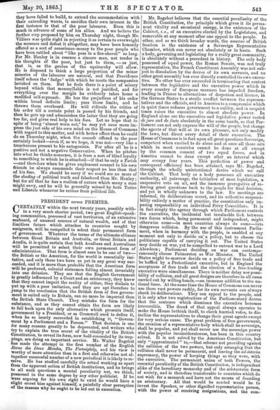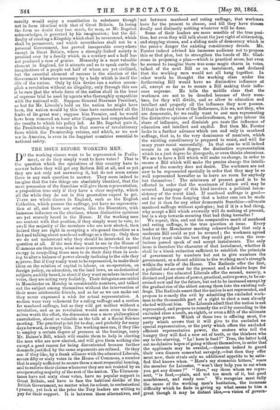PRESIDENT versus PREMIER.
CERTAINLY within the next twenty years, possibly with- in a very much shorter period, two great English-speak- ing communities, possessed of vast territories, of an extensive seaboard, of unusual sources of natural wealth, and of that limitless future which attaches to countries sought by emigrants, will be compelled to select their permanent form of government. Whatever the terms of the ultimate alliance between Great Britain and Australia, or Great Britain and Acadia, it is quite certain that both Acadians and Australians will be permitted to select their own permanent form of administration. That form is almost sure to be one of two— the British or the American, for the world is essentially imi- tative, and only those two have as yet in any great way suc- ceeded, and it is more than probable that the American form will be preferred, colonial statesmen falling almost invariably into one delusion. They see that the English Government is greatly influenced by a Court and an aristocracy, they know that they cannot import the reality of either, they disdain to put up with a poor imitation, and they are apt therefore to jump to the conclusion that the British form of free govern- ment is suited only to Britain, can no more be imported than the British State Church. They mistake the form for the -substance, and as they cannot obtain the form are likely to fall back upon the only alternative which presents itself, -government by a President, or as Cromwell used to define it, when he so nearly succeeded in establishing it, " Govern- enent by a Parliament and a Person." That decision is one for many reasons greatly to be deprecated, and writers who try to explain the true secret of the vitality of the British Constitution, to reveal its form, now half-concealed by its trap- . pings, are doing an important service. Mr. Walter Bagehot has made the attempt in the first number of the English Revue des Deux Hondas, The Fortnightly, and his view is "worthy of more attention than in a first and otherwise not al- together successful number of a new periodical it is likely to re- ceive. He has studied carefully the actual working as apart from the apparent action of British institutions, and he brings to all such questions a mental peculiarity not, we think, possessed in the same degree by any other publicist. If he 'were arguing for his own right to exist he would hitve a slight secret bias against himself, a painfully clear perception - of the reasons why he ought to be led out to execution. Mr. Bagehot believes that the essential peculiarity of the British Constitution, the principle which gives it its perma- nent vitality and occasional energy, is the existence of the Cabinet, i. e., of an executive elected by the Legislature, and removable at any moment after one appeal to the people. In other, and as we think broader words, the essence of British freedom is the existence of a Sovereign Representative Chamber, which can never act absolutely or in haste. Such a body, governing and legislating for a really great community, is absolutely without a precedent in history. The only body possessed of equal power, the Roman Senate, was not truly representative, the French Constituent Assembly was not sub- ject to dissolution by the decree of its own servants, and no other great assembly has ever directly controlled its own execu- tive. No other has ever succeeded in terminating that contest between the legislative and the executive power which in every country of European manners lies impeded freedom, leading in France to alternations of despotism and licence, in the German States to a sterile conflict between the represen- tatives and the officials, and in America to a compromise which in quiet times reduces government to a nullity, and in unquiet times raises the executive to almost absolute power. In England alone are the executive and legislative power vested de jure and de facto absolutely in the same hands, so that Par- liament can not only express the will of the people, but change the agents of that will at its own pleasure, not only modify the laws, but direct every detail of their execution. The House of Commons is in fact upon all great questions Sovereign, competent when excited to do alone and at once all those acts which in most countries cannot be done at all except by the common consent of two equal forces, and in America cannot be done except after an interval which may occupy four years. This perfection of power and consequent efficiency has been attained, says Mr. Bagehot, through the wholly unintentional device which we call the Cabinet. That body as a body possesses all executive authority, all patronage, the initiative of most legislation, a suspensive veto on all, and the immense prerogative of re- ferring great questions back to the people for final decision, and yet is wholly unknown to the law. Its meetings are informal, its deliberations secret, and its collective responsi- bility entirely a matter of practice, the constitution only im- posing responsibility on individual Privy Councillors. It is in fact simply the agency through which Parliament controls the executive, the incidental but invaluable link between two forces which, being permanent and independent, might otherwise come—in most countries always do come—into dangerous collision. By the use of this instrument Parlia- ment, when in harmony with the people, is enabled at any moment not only to decide on: a policy, but to choose the politicians capable of carrying it out. The United States may. decide on war, yet be compelled to entrust war to a Lord Aberdeen ; Parliament deciding on war can contempo- raneously choose Palmerston as War Minister. The United States might to-morrow decide on a policy of free trade and be baffled by a Protectionist executive, but in England the acceptance of free trade and the election of a free-trading executive were simultaneous. There is neither delay nor possi- bility of collision, and all great designs are therefore in all cases carried out by willing hands,—an immense addition to the na- tional force. At the same time the House of Commons can never use these vast powers rashly, for its own servants can always check its deliberations. They can appeal to the people, and it is only after two registrations of the Parliamentary decree that the sentence which dismisses the executive becomes irreversible. The dread of that appeal always operates to make the House bethink itself, to check hurried votes, to dis- incline the representatives to change their great agents except for very serious cause. The great problem of free government, the creation of a representative body which shall be sovereign, shall be popular, and yet shall never use the sovereign power with the popular inconsiderateness, has been in this country solved. It is not solved by the American Constitution, but only " approximated " to,—that scheme not providing against the collision of the two powers, but only arrangicg that the collision shall never be permanent, and leaving the ad-interim supremacy, the power of keeping things as they were, with the executive. The permanent union of both Powers, the essential peculiarity of the British Constitution, is independent alike of the hereditary monarchy and of the aristocratic form of society, and is therefore transferable to countries which do not wish for a monarch and have not the means of founding an aristocracy. All that would be needed would be to invest the Speaker, or other dignified representative person, with the power of receiving resignations, and the cow- munity would enjoy a constitution in substance though not in form identical with that of Great Britain. In losing the form no doubt they lose much, for man, as Mr. Bagehot acknowledges, is governed by his imagination; but the dif- ficulty of creating a Kingship which shall be reverenced, which shall be permanent, and which nevertheless shall not be a personal Government, has proved insuperable everywhere except in Great Britain, where a strongly-linked society is presided over by a family which in a century and a half has not produced a man of genius. Monarchy is a most valuable element in England, for it attracts and so to speak curbs the imaginations of a people not half of whom are yet civilized, but the essential element of success is the election of the Government whenever necessary by a body which is itself the elite of the nation. Only by this device can a nation accom- plish a revolution without an illegality, only through this can it be sure 9iat the whole force of the nation shall in the hour of supreme trial be used by agents who thoroughly sympathize with the national will. Suppose General Sherman President, as but for Mr. Lincoln's hold on the nation he might have been, the nation would by this time have surrendered all the fruits of its great war; suppose him Premier, and he would have been removed an hour after Congress had comprehended the results to which his policy led. As Mr. Bagehot puts it, the Presidentship is wanting in that reserve of revolutionary force which the Premiership retains, and which, as we now see in America, is even in the happiest countries essential to national safety.































 Previous page
Previous page